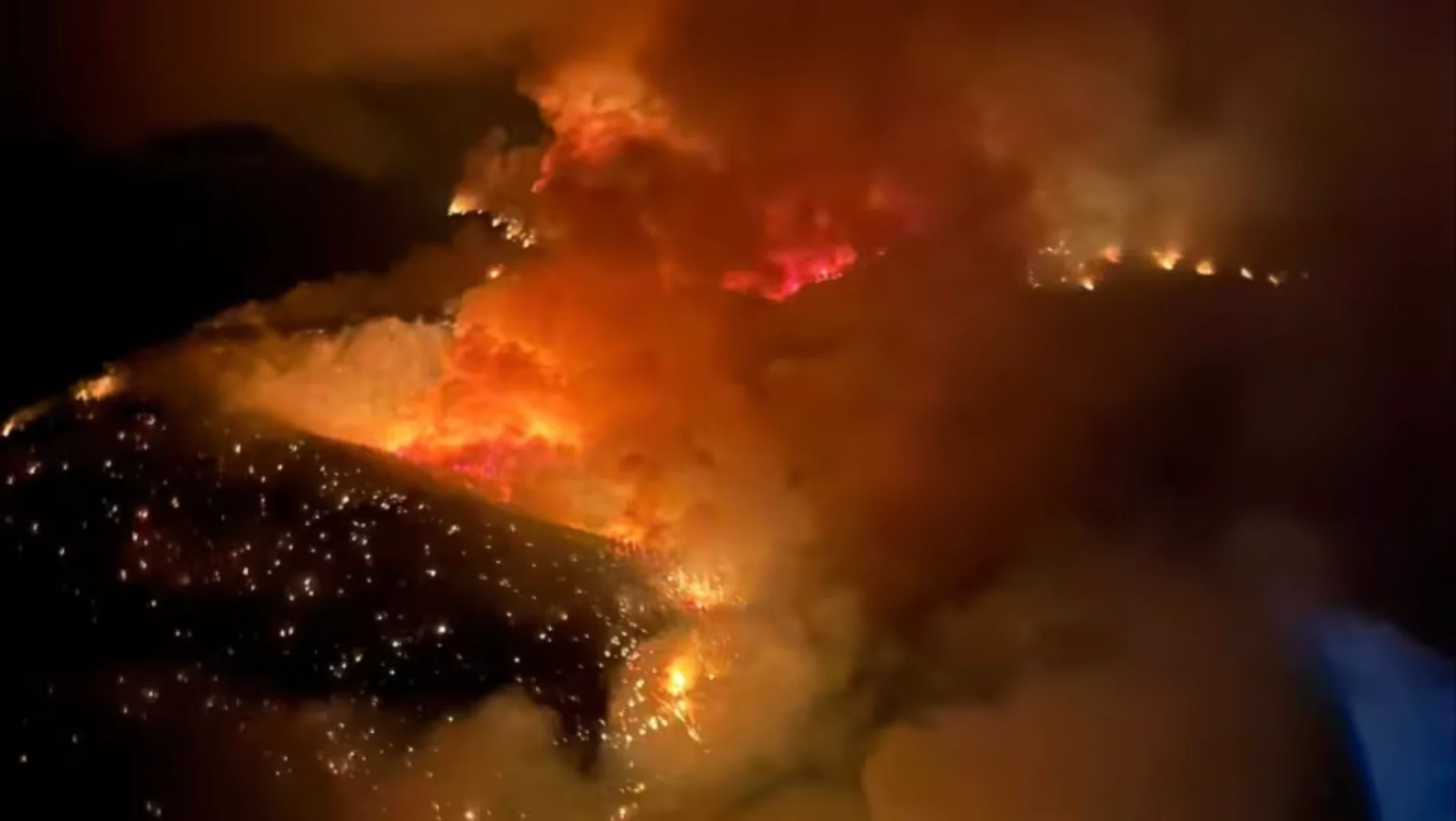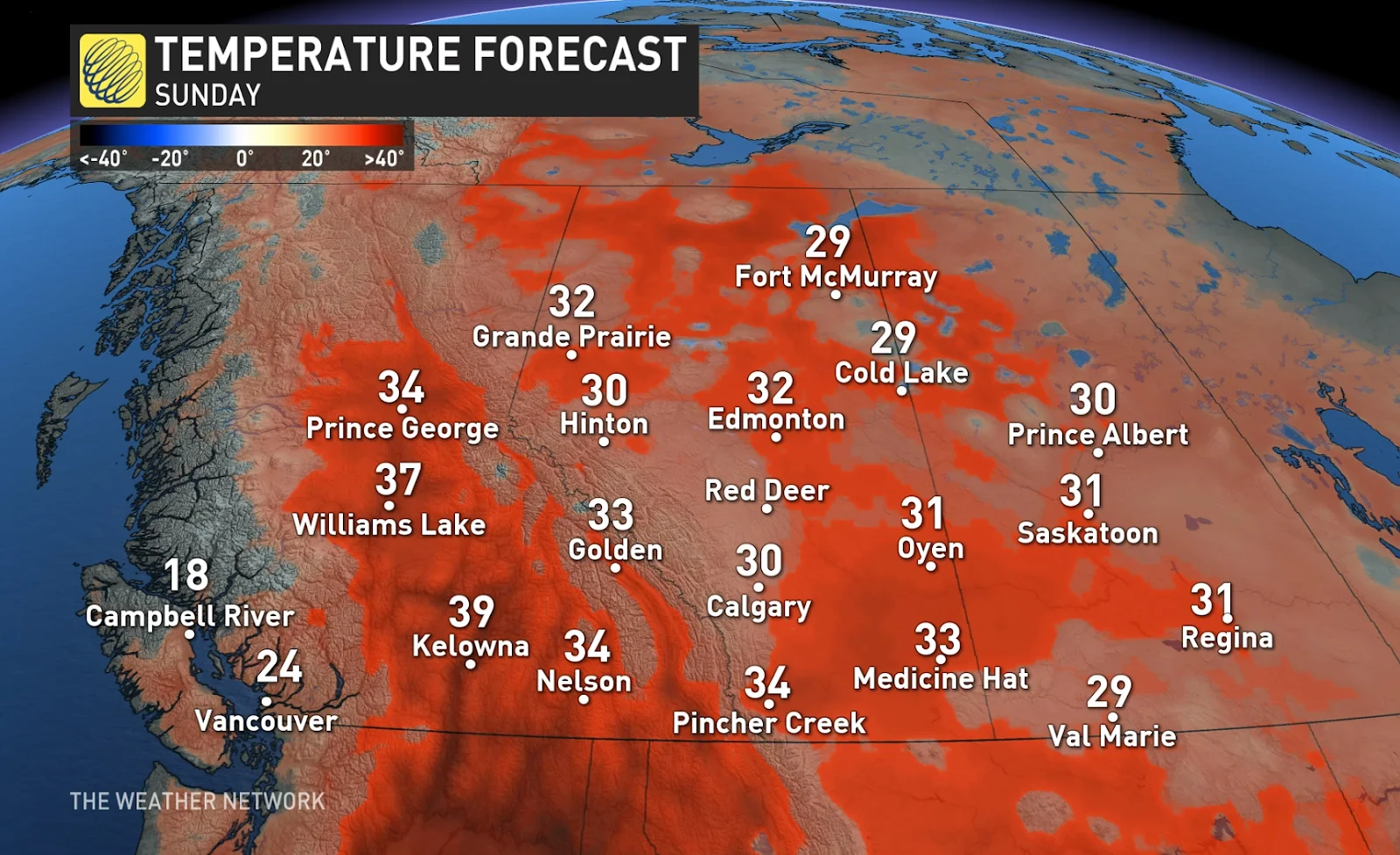
Smoky skies across much of B.C. as wildfires grow
CANADA'S WILDFIRES: Visit The Weather Network's wildfire hub to keep up with the latest wildfire activity across Canada
Approximately 2,000 people in the Village of Ashcroft have been told to be ready to leave their homes at a moment's notice, after an evacuation alert was put into place at noon Friday for the entire community, about 100 kilometres west of Kamloops.
The warning comes with officials forecasting smoky skies across much of B.C. as over 300 fires burn across the province, with more expected in the days ahead.

Cliff Chapman with the B.C. Wildfire Service (BCWS) said Thursday the province appeared to be "on the precipice of a very challenging 72 hours" with hot and dry weather, dry lightning and strong winds forecast.
Ashcroft Mayor Barbara Roden said residents of her community were "twitchy," as smoke blanketed the sky, recalling previous years when fires threatened the community.
"We're getting ash falling on our cars, on our decks, on our houses, which is very disconcerting for people," she said.
Officials are reminding people headed out for the weekend to check local conditions and to remember there is a provincial campfire ban in place for all parts of B.C. except Haida Gwaii.
Heat, smoky sky warnings
On Friday, the province issued a smoky sky bulletin for parts of the Interior and north, warning that several communities were likely to be affected by wildfire smoke in the next 48 hours.

DON'T MISS: What to pack in your emergency grab-and-go kit
The communities covered by the bulletin include Fort St. John, where air quality was measured at 10+ on Friday afternoon.
Other regions experiencing or expecting smoky skies include Kamloops and the South Thompson, parts of the Kootenays including Creston, Cranbrook and Kimberly, Fort Nelson, the South Peace including Dawson Creek, the Arrow Lakes region and the 100 Mile House area.

Smoky skies blanketed Fort St. John, B.C. on July 19, 2024. (Submitted by Tanya Fletcher)
Environment Canada on Friday also issued a series of severe thunderstorm watches across much of the B.C. Interior, and a severe thunderstorm warning for the Stuart-Nechako region in the north.
Heat warnings remain in place for much of the province's Interior and north, with temperatures above 30 C, reaching up to 40 C in some areas.
Ken Dosanjh, a meteorologist with Environment and Climate Change Canada, says high temperatures are expected to continue until early next week.
He says thunderstorms and dry lightning that have occurred in the southern half of the province over the past few days are expected to continue throughout Friday.

"Once you do get lightning strikes that occur, there's kind of a longer time scale where new fires will pop up," he said.
The BCWS says most of the fires burning in the province were started by lightning.
Anyone who sees a wildfire should report it using the Wildfire App or by calling 1-800-663-5555 (toll-free) or *5555 on a cellphone.
Aggressive Shetland Creek wildfire puts thousands on alert
The most significant wildfire burning as of Friday afternoon was the Shetland Creek blaze, which originated approximately 7.5 kilometres north of Spences Bridge on July 12.
It has exploded in size, growing from 50 square kilometres on Thursday to more than 130 square kilometres on Friday.
That's prompted several evacuation orders and alerts, including an alert for the entire Village of Ashcroft, with residents told to be ready to leave at a moment's notice.
RELATED: Wildfires worsen across Western Canada, smoke issues spread into Ontario, U.S.
"When you see a fire that is that dynamic and aggressive, growing that much in such a short period of time, that's obviously concerning," Roden said.
"It's bringing back many bad memories, bad experiences."
Approximately 2,000 residents are affected by the alert, which also extends to rural parts of the Thompson-Nicola Regional District.
The Cook's Ferry Indian Band has issued orders for several reserves.
More than 100 people have already been forced from their homes by the fire, including eight properties in Ashcroft and approximately 85 properties in the Venables Valley area north of Spences Bridge, among them a Hare Krishna village.
Radha-Prama McAllister is a resident of the Hare Krishna community Saranagati, located in an off-the-grid patch of rural B.C. about a 320-kilometre drive northeast of Vancouver.
She described the experience of evacuating as devastating but says the outpouring of support they have received from local residents has been amazing.
"People in the village of Ashcroft and Cache Creek have been coming together doing whatever they can to take care of us," said McAllister.
"This has truly been such a beautiful experience of community spirit."
As parts of Cache Creek, where McAllister's family is staying, have been put on evacuation alert, she says community members may have to move again soon.
The Village of Cache Creek on Friday issued an evacuation alert because of the fire out of an "abundance of caution." The alert includes the Cache Creek Regional Airport and nine other properties, but the main sections of the village are not yet on alert.
And the nearby Ashcroft Indian Band, which is also on evacuation alert, posted a notice on Facebook Friday, saying band leaders understand that "everyone is on edge with the Shetland Creek Fire burning nearby."
The statement said they are in constant contact with the B.C. Wildfire Service, getting updates when available and they appreciate everyone's co-operation in conserving water they have in the reservoirs to "use in a worst-case scenario."

The B.C. Wildfire Service says the Shetland Creek wildfire has been exhibiting 'aggressive' wildfire behaviour forcing evacuations in nearby communities. (B.C. Wildfire Service)
"In the meantime, we have our maintenance and fire mitigation crews out in the community, adding more fireguards around the south and east side. As an additional piece to our regular fire mitigation practices, they are clearing debris and flammable fuels from around power poles and hydrants, and we have a water tank on a trailer with hoses ready to go."
The wildfire service says 71 firefighters and six helicopters are battling the blaze in addition to structure protection personnel, heavy equipment operators, and an incident management team.
Other fires keeping crews busy are the Calcite Creek fire 41 kilometres south of Princeton and the Aylwin Creek fire near Valhalla Provincial Park in the Kootenay region, both of which have active evacuation orders and alerts in place.
This article, written by Michelle Gomez and Andrew Kurjata, was originally published for CBC News.









